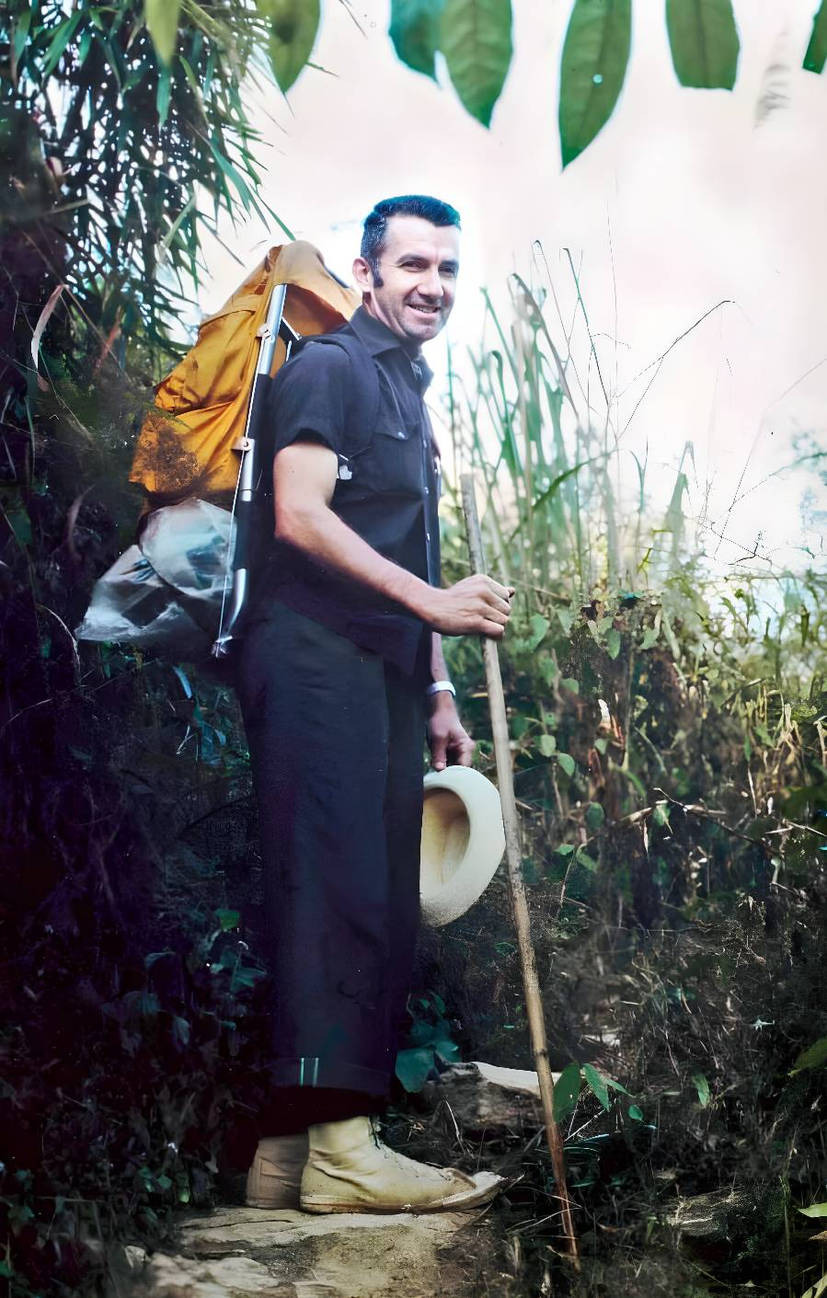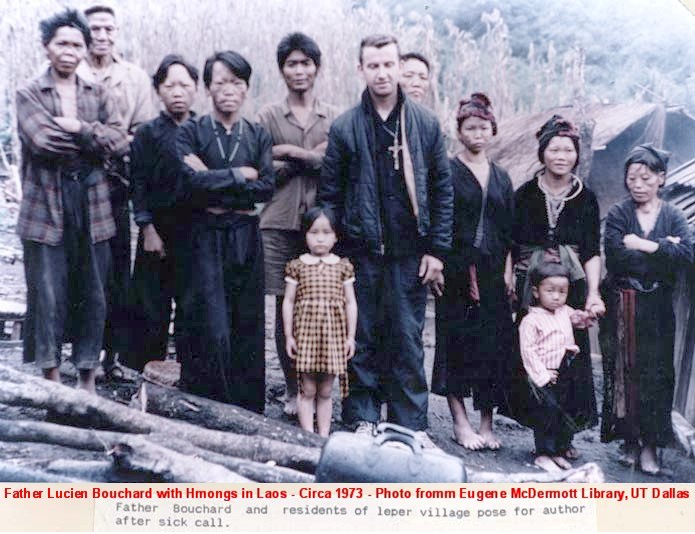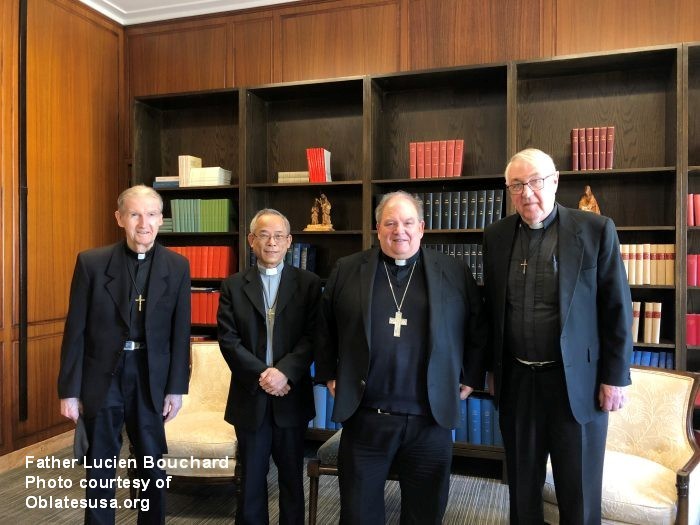
Father Lucien Bouchard traversing mountain regions at Sam Neua, Laos
Photo courtesy of Missionary Oblates of Mary Immaculate


In a documentary on the Secret War in Laos that I found on YouTube titled "What was the Secret War in Laos", Dr. Paul T. Carter1 mentioned Father Lucien Bouchard ministered to the Hmong villagers in Laos. Though I had never learned his name when I first met him at the CIA base in Long Tieng,2 I googled Father Bouchard and immediately recognized him from his picture. He is the Catholic Father I write about in an earlier story titled "Catholic Father".
In another article sponsored by the Missionary Oblates of Mary Immaculate, Father Bouchard was being honored by the Hmong community in St. Paul Minnesota.3 He is currently residing in Tewksbury, Massachusetts, and just turned 94 in March of this year. Of all the people I’ve met in my lifetime, Father Bouchard has to be the one I hold in highest regard above all others for voluntarily putting himself in one of the most dangerous combat environments to provide God's most precious gift of ministry to those who are the most in need. As God's chosen representative on earth, Father Bouchard was in essence "running a rescue shop within a yard of hell".
Placing His Life in God’s Hands
Father Lucien Bouchard, O.M.I. says he has not had much stress in his life. He might be the only person in the world who believes such a claim.
Father Lucien has survived assassination attempts, attacks by soldiers with small arms and living in some of the most remote and unhealthy places on the planet. But despite the risks, Fr. Lucien says he has slept well every night of his nearly 65 years as an Oblate priest.
“I knew it was dangerous but I was never nervous,” said Fr. Lucien. “I had put my life in God’s hands, and when you do that you will always be fine, no matter what situation you are in.”
Father Lucien put his life in God’s hands on June 17, 1955 when he was ordained a Missionary Oblate priest. He joined the Oblates because he had read a book about their diverse and difficult missions around the world.
“I thought the Oblates might be a good fit because I wanted to go somewhere that was difficult,” said Fr. Lucien. “And they didn’t disappointment me.”
After ordination, Fr. Lucien was convinced he was going to be a missionary in the African nation of Chad. A bishop from there had come to the U.S. to recruit missionaries, and Fr. Lucien quickly asked the Superior General to send him there.
But when he received his assignment, Fr. Lucien got a surprise. It wasn’t Chad but rather Laos, a country he couldn’t even find on a map. Luckily, Laos would become his dream assignment, because it was very, very difficult.
In the 1950s, the Communists began their violent campaign to take control of Southeast Asia. War in the region would last for 20 years, and Fr. Lucien would spend nearly that much time working in Laos caring for the needs of the very poor, including refugees.
Newly ordained, Fr. Lucien soon found himself living in the remote mountains of Laos among the Hmong people. He didn’t speak their language. For a few weeks he ministered with another priest who then took his home leave. Father Lucien was the only priest in the area for six months.
The Hmong are an ethnic minority in Laos and opposed the Communists, siding with the United States during the Vietnam War. The Catholic Hmong were also persecuted because of their faith.
For more than a decade, Fr. Lucien would have to avoid the Communists. Guards would be in the villages where he ministered to keep an eye out for people coming to arrest him.
“I was fortunate, once I left a village and the next day it got attacked and several people died,” said Fr. Lucien.
One of Fr. Lucien’s most fortunate events was when he was traveling along a path in the jungle to get medicine to a leper community.
“There was a group of Communist soldiers hiding close to the trail. As I walked by those soldiers, one of them aimed at me with his rifle. But another soldier from behind told him not to kill me, because I had been coming there to help his relatives who had leprosy,” said Fr. Lucien.
Not as fortunate as Fr. Lucien were six other Oblate priests who became martyrs in Laos at the hands of the Communists. Father Lucien ministered with some of them, and like the martyrs was willing to lay down his life for the people of Laos. But God had other plans.
As the war intensified, Fr. Lucien worked in villages that were often attacked with small arms fire. He would live in squalid conditions, and most of his meals were primarily rice that had been dropped into the camps by transport planes. He jokes that twice he was nearly killed by falling bags of rice.
The military, after years of being outfoxed by the missionary priest, was growing more agitated with Fr. Lucien. They began to intensify efforts to silence him. Eventually, the only option for Fr. Lucien to stay alive was to get out of Laos. He remained with his beloved Laotian people as long as possible before heading to Thailand.
“I got on a ferry around noon and if I had stayed just a couple of hours longer that would have been the end of me,” said Fr. Lucien. “The soldiers arrived in the afternoon and would have arrested, tortured and killed me.”
After 18 years of struggles in Laos, Fr. Lucien chose another difficult mission and accepted the challenges of ministering in Borneo. He would spend 28 years there.
“Laos was my first dream to come true and Borneo was my second dream to come true,” said Fr. Lucien. “I loved every minute I was there.”
Father Lucien spent most of his time in Borneo serving small Catholic populations in isolated villages. His last parish had 22 villages attached to it and it would take Fr. Lucien more than two months to complete a circuit, mostly by foot.
After 47 years of missionary work in Southeast Asia, it was finally time for Fr. Lucien to return home to the United States. Decades of difficult living conditions were having an impact on the diminutive priest. So Fr. Lucien left the foreign missions at age 76, but didn’t stop being a missionary.
He took an assignment at Christ the King Parish near Miami, Florida. Just a few weeks before he arrived a hurricane had damaged much of the area. Father Lucien ministered at Christ the King for more than seven years, a diverse parish comprised mostly of immigrants from the Caribbean and South America.
In 2013, Fr. Lucien returned to his native Massachusetts to live at the Immaculate Heart of Mary Residence, a home for elder and infirmed Oblates. Today, at the age of 91, he still ministers and occasionally travels to Hmong communities in the United States.
Father Lucien also ministers through the power of prayer, and is always there for a brother Oblate who is in need of a friend. He often sits at their bedside well into the night so that they know they are not alone as their earthly journey comes to an end.
Father Lucien admits that he is slowing down a bit. He usually needs a nap in the afternoon to recharge his battery. And when he lays down, he usually sleeps well. That is because Fr. Lucien continues to live without much stress, because he knows that God is always there by his side.
Laotian Youths Battle Reds In 'Crusade' Priest Says
SAM NEUA, Laos — Young Catholic men in this northern Laos area under attack by Communist guerrillas “consider fighting against atheistic Communism not only patriotic but also a religious duty.” This stand was reported by Father Lucien Bouchard, 0.M.1., one of five missionary priests in the Sam Neua mission which takes care of some 5,000 Catholics.
“When the Communists attacked about six weeks ago,” said Father Bouchard, “we decided to stay with our flock regardless of the consequences. We felt that they needed us more than ever during these troubled times.”
A United Nations fact-finding mission appointed by the Security Council is now in Laos to report on the situation. The Laotian government has accused Communist North Viet Nam of aiding Laotian Pathet Lao rebels who revolted against the government in northeastern Laos. Walks to Villages Father Bouchard said his work consists of visiting six or seven mountain villages each week. “I have to walk,” he said, “because the mountain trails are too steep for horses.!’ In noting that many young Catholic men have volunteered to fight as guerrillas against the Communists, Father Bouchard said “for them it is not an ordinary war but a crusade.” He said they had been under Communist domination from 1952 to 1958 and “do not want this to happen again.”
He asked prayers for troubled Laos. Father Bouchard said that “in spite of those six years of intensive Indoctrination by the Communists,, they have remained steadfast in their Catholic Faith and we are confident that they will remain so whatever the outcome of this recent invasion.” The steadfastness of the Catholics in the Sam Neua province was attributed by Father Bouchard to the martyrdom of Father Joseph Tien, the province’s only native priest. Father Tien was put to death by the Communists in April of 1954 after refusing a chance to escape, preferring—as Father Bouchard put it—“to stay with the prisoners to give them the sacraments before their death sentences.”

Father Lucien Bouchard traversing mountain regions at Sam Neua, Laos
Photo courtesy of Missionary Oblates of Mary Immaculate


1 Dr. Paul T. Carter retired from the U.S. Army, worked for the Defense Intelligence Agency and is a leading authority in the intelligence field on the Second Indochina War and Thailand.
2 Long Tieng (also spelled Long Thieng, Long Chieng, Long Cheng, or Long Chen)
3 https://www.omiusa.org/index.php/2018/05/08/17802/
©Copyright texan@atudemi.com - October 2023